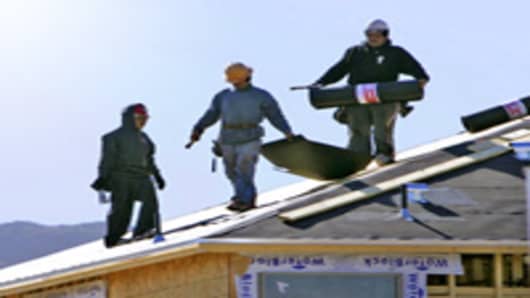Applications for home building permits, a key gauge of future construction, fell in September by the largest amount in five months—a discouraging sign for the housing industry. A rebound in housing is needed to support a broader economic recovery.
Representatives for the industry told a congressional panel Tuesday that the $8,000 tax credit for first-time buyers needs to be extended and expanded to ensure the housing sector will emerge from the recession.
But the Obama administration, facing soaring budget deficits, has not decided whether to support any extension. And some private economists played down the impact of such a move, arguing that most interested buyers already had taken advantage of the tax break.
Meanwhile, the Labor Department said wholesale prices fell 0.6 percent last month on a drop in energy costs. Outside food and energy, core inflation edged down 0.1 percent. In the 12 months ending in September, core wholesale prices rose a modest 1.8 percent.
The Commerce Department said construction of homes and apartments rose 0.5 percent last month to a seasonally adjusted annual rate of 590,000 units. That was a weaker showing than the 610,000 economists had expected.
The applications for building permits fell 1.2 percent, the second setback in the past three months and the biggest decline since a 2.5 percent drop in April. It likely means construction will weaken a bit in coming months, partly because builders had accelerated projects to complete them before the tax credit expires Nov. 30.
The industry also faces other challenges, including record levels of home foreclosures and unemployment that is currently at a 26-year high of 9.8 percent and not expected to peak until next summer, said Sal Guatieri, an economist at BMO Capital Markets.
But Patrick Newport, a housing economist at Global Insight, said a slow recovery likely will continue because inventories of new homes have fallen so far that builders have an incentive to ramp up sales with or without a tax credit.
- Realty Check Blog: HUD Hints on Home Buyer Tax Credit
"We see a very slow recovery for housing that will gradually gain strength over the next two to three years before construction gets back to more normal levels," Newport said.
Housing has been struggling to recover this year following the worst collapse in decades, which helped pull the overall economy into the longest recession since the 1930s. Real estate agents and homebuilders are lobbying Congress to extend the tax credit, arguing government support remains critical.
At a hearing Tuesday before the Senate Banking Committee, Sen. Johnny Isakson, R-Ga., who spent his career as a real estate agent before being elected to Congress, said "this market is going to die a sudden death" without an extension.
Isakson and committee chairman Christopher Dodd, D-Conn., want to extend the credit until June 30 and to drop the requirement that the credit be available only to first-time buyers at an estimated cost of $16.7 billion.
The lawmakers have suggested that their measure be attached to an extension of federal assistance to the millions in danger of exhausting unemployment insurance benefits.
Housing Secretary Shaun Donovan testified that supporting the housing market "can be very expensive, especially at a time of significant budget deficits."
The administration will make a recommendation on whether to extend the credit in the coming weeks, after studying data on tax filings from the Internal Revenue Service.
- Slideshow: Highest End Real Estate
The drop in wholesale prices was another sign the recession had kept a lid on inflation. Last week, the government said consumer prices edged up a modest 0.2 percent in September.
But the cost for a barrel of crude jumped $10 this month, hitting $75 for the first time in a year last week and then passing $80 early Tuesday. The value of the dollar plunged in October and because crude is bought and sold in the U.S. currency, international investors who can essentially buy more crude for less have rushed in to snap up oil contracts.
If oil prices continue to rise, gasoline and other energy products, which make up 17.8 percent of the government's Producer Price Index, will become more expensive for consumers in coming months. But analysts said the lingering impact of the recession, along with rising unemployment, will keep a lid on overall inflation.
The 0.5 percent rise in overall housing construction in September followed a 1 percent drop in August that was revised down from an initial estimate of a 1.5 percent gain.
Construction of single-family homes rose 3.9 percent last month to an annual rate of 501,000 units, reversing a 4.7 percent drop in August. Multifamily construction, a much smaller and more volatile segment, posted a 15.2 percent drop following a 20.7 percent rise in August.



